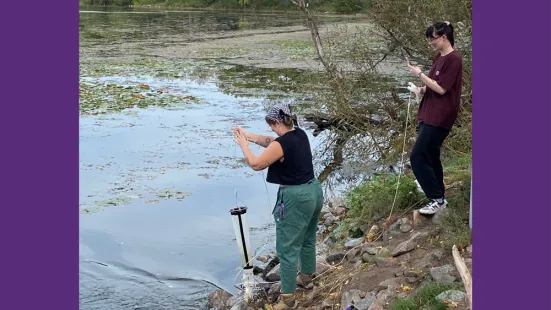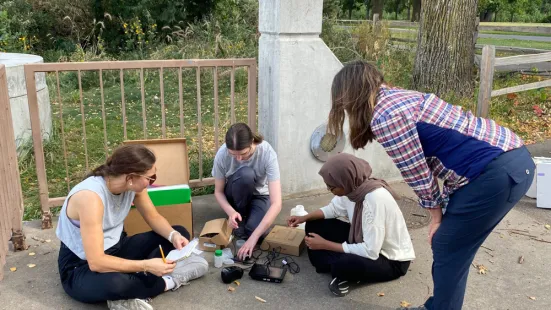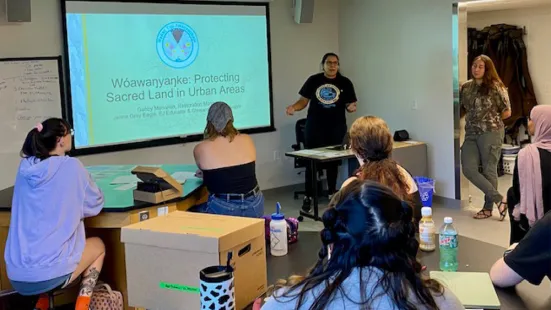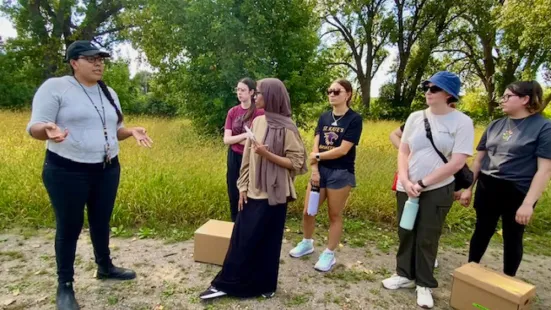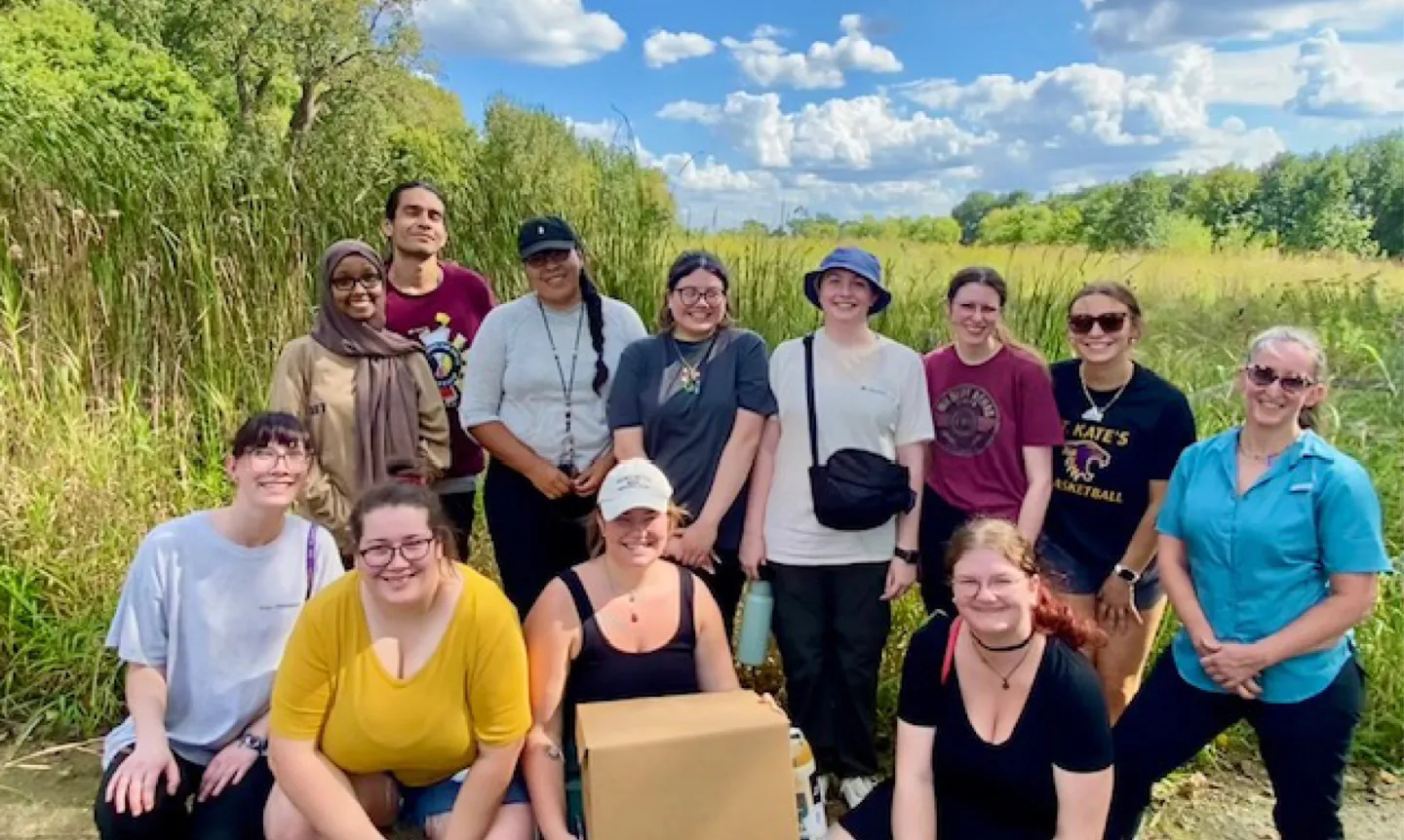
Paula Furey, PhD, associate biology professor and endowed professor in the sciences (far right) with the fall 2024 Algal Ecology students and Waḳaƞ Típi Awaƞyaƞkapi collaborative team during a visit to the area now officially known as Waḳaƞ Típi. Photo provided.
This spring, at the recommendation of the Tribal Historic Preservation Office, the City of Saint Paul restored the indigenous place names Waḳaƞ Ṭípi and Wic̣aḣapi to the landscapes formerly known as the Bruce Vento Nature Sanctuary and Indian Mounds Regional Park. These areas on the East Side of Saint Paul, collectively known as Imniżaska, are sacred to the Dakota people.
Last fall, St. Catherine University students in associate biology professor and endowed professor in the sciences Paula Furey, PhD’s Algal Ecology class had the opportunity to learn about these Dakota sacred sites and the cultural significance of water to the Dakota people as part of a Community-Engaged Learning (CEL) project. The class examined the water quality of Lake Phalen and Phalen Creek by analyzing algae, which reflects the overall health of the aquatic environment.
Algal Ecology collaborated with Waḳaƞ Típi Awaŋyaŋkapi, a Native-led environmental stewardship organization dedicated to engaging people in honoring and caring for natural places, as well as the sacred sites and cultural value within them. In addition to restoring and caring for the land surrounding Waḳaƞ Típi, Waḳaƞ Típi Awaŋyaŋkapi aims to educate the public about Waḳaƞ Típi Cave, a sacred Dakota site located at the end of a long chain of ponds, rivers, and lakes, including Lake Phalen. As part of their restoration efforts, Waḳaƞ Típi Awaŋyaŋkapi is working to “daylight” Phalen Creek, restoring its natural flow above ground after it was forced underground due to urbanization.
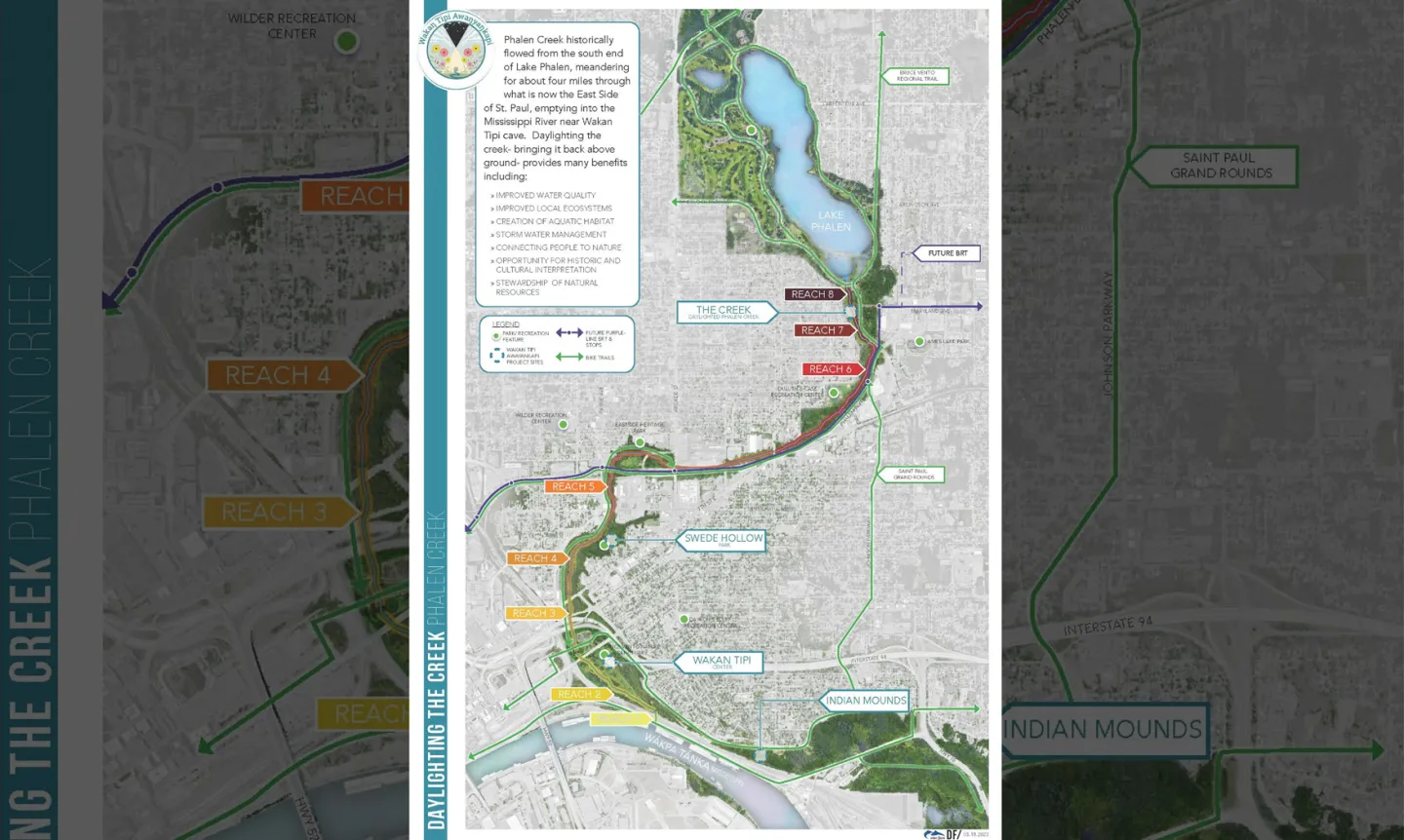
Map of Phalen Creek and associated bodies of water. Image from https://www.wakantipi.org/daylighting.
Students in Algal Ecology collected algae and water samples from the south end of Lake Phalen, where water exits the lake into underground Phalen Creek, and from a pond inside Waḳaƞ Típi. These samples provided baseline data that Waḳaƞ Típi Awaŋyaŋkapi could use to monitor water quality during the “daylighting” project.
After analyzing the algae and water samples, students presented their recommendations to Jen Grey Eagle and Gabby Menomin of Waḳaƞ Típi Awaŋyaŋkapi. They advised regular monitoring of water bodies to watch for changes in conductivity, turbidity, nutrient levels (nitrogen and phosphorus), or surface blooms of cyanobacteria — which can look like “spilled paint” — as these factors may signal pollution or eutrophic conditions, such as harmful algal blooms.
Gabby Menomin, director of land environment at Waḳaƞ Típi Awaŋyaŋkapi, said, “This collaborative project with the students at St. Kate’s was an amazing opportunity to not only connect with the students about the importance of Waḳaƞ Típi and Phalen Creek, but also give them a hands-on opportunity to connect with the water and land in a meaningful and impactful way.”
This community-engaged learning project allowed Algal Ecology students to learn and practice a variety of career-ready skills such as water sampling, microscopy, and lab analysis techniques, all while collaborating with a community partner in support of environmental justice. Kennedy Kolb ’25 says collaborating with Waḳaƞ Típi Awaŋyaŋkapi in the class was “one of the most fulfilling experiences I have had at St. Kate’s. Not only was it a whole lot of fun and a chance to apply my biology skills in real-life, but it was a good reminder that science is driven by community. Science isn’t an individualistic pursuit but a collective one. It’s through building relationships with our neighbors and nature that we are able to make meaningful changes and better understand the world around us.”
The Algal Ecology course will be part of the new Environmental and Sustainability Studies major, launching at St. Kate’s in Fall 2025. Furey co-developed this interdisciplinary major, which focuses on the complex relationships between humans and the environment, with a focus on environmental justice and sustainability. Environment and Sustainability majors will develop the knowledge, skills, and perspectives to address pressing environmental challenges and promote equitable solutions for a sustainable future. The major offers courses across a variety of disciplines, including those with community-engaged learning opportunities like Algal Ecology. Students will also benefit from labs and classes in the newly renovated spaces in Mendel.
This collaboration with Waḳaƞ Típi Awaŋyaŋkapi was supported by a St. Kate’s Teaching Hub Innovation Grant and by St. Kate’s Center for Community Work and Learning.
